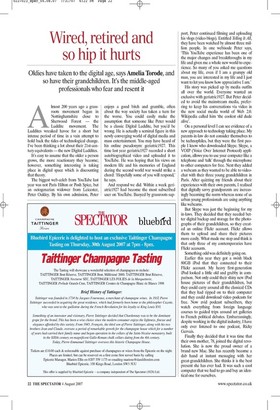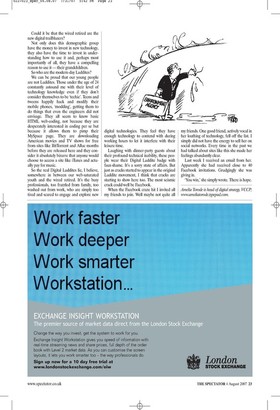Wired, retired and so hip it hurts
Oldies have taken to the digital age, says Amelia Torode, and so have their grandchildren. It's the middle-aged professionals who fear and resent it Almost 200 years ago a grassroots movement began in Nottinghamshire close to Sherwood Forest — the Luddite movement. The Luddites wreaked havoc for a short but intense period of time in a vain attempt to hold back the tides of technological change. I've been thinking a lot about their 21st-century equivalents — the new Digital Luddites.
It's easy to assume that the older a person grows, the more reactionary they become; however, something interesting is taking place in digital space which is discounting that theory.
The biggest web-celeb from YouTube last year was not Paris Hilton or Posh Spice, but an octogenarian widower from Leicester, Peter Oakley. By his own admission, Peter enjoys a good bitch and grumble, often about the way society has taken a turn for the worse. You could easily make the assumption that someone like Peter would be a classic Digital Luddite, but you'd be wrong. He is actually a seminal figure in this newly converging world of digital media and mass entertainment. You may have heard of his online pseudonym: geriatric1927. This time last year geriatric1927 recorded a short autobiographical video and uploaded it to YouTube. He was hoping that his views on modern life and his memories of England during the second world war would strike a chord: 'Hopefully some of you will respond,' he says.
And respond we did. Within a week geriatric1927 had become the most subscribed user on YouTube. Buoyed by grassroots support, Peter continued filming and uploading his vlogs (video-blogs). Entitled Telling It All, they have been watched by almost three million people. In one webisode Peter says, 'This YouTube experience has been one of the major changes and breakthroughs in my life and given me a whole new world to experience. So many of you asked me questions about my life, even if I am a grumpy old man, you are interested in my life and I just want to let you know how appreciative I am.'
His story was picked up by media outfits all over the world. Everyone wanted an exclusive with geriatric1927. But Peter decided to avoid the mainstream media, preferring to keep his conversations via video in the new social media world of Web 2.0. Wikipedia called him `the coolest old dude alive'.
On a personal level I can see evidence of a new approach to technology taking place. My parents-in-law do not consider themselves to be technophiles, but they were the first people I know who downloaded Skype. Skype, a VOIP (Voice Over Internet Protocol) application, allows you to use your computer like a telephone and 'talk' through the microphone to other computers for free. Next they added a webcam as they wanted to be able to videochat with their three young grandchildren in Paris. After quizzing my friends about their experiences with their own parents, I realised that digitally savvy grandparents are increasingly becoming the norm whereas none of us urban young professionals are using anything like webcams.
But Skype was just the beginning for my in-laws. They decided that they needed better digital backup and storage for the photographs of their grandchildren, so they created an online Flickr account. Flickr allows them to upload and share their pictures more easily. What made me stop and think is that only three of my contemporaries have Flickr accounts.
Something odd was definitely going on.
Earlier this year they got a swish black 80GB iPod that they connected to their Flickr account. My heavy first-generation iPod looked a little old and grubby in comparison. Not only could their shiny new iPod house pictures of their grandchildren, but they could carry around all the classical CDs that they had ripped on to their computer and they could download video podcasts for free. Now avid podcast subscribers, they watch everything from foreign language courses to guided trips around art galleries to French political debates. Embarrassingly, despite working in the digital industry, I have only ever listened to one podcast, Ricky Gervais.
Finally they decided that it was time that their own mother, 78, joined the digital revolution. She is now the proud owner of a brand new Mac. She has recently become a dab hand at instant messaging with her great-grandchildren. She thinks it is the best present she has ever had. It was such a cool computer that we had to go and buy an identical one for ourselves.
Could it be that the wired retired are the new digital trailblazers?
Not only does this demographic group have the money to invest in new technology, they also have the time to invest in understanding how to use it and, perhaps most importantly of all, they have a compelling reason to use it — their grandchildren.
So who are the modern-day Luddites?
We can be proud that our young people are not Luddites. Those under the age of 24 constantly astound me with their level of technology knowledge even if they don't consider themselves to be lechie'. Teens and tweens happily hack and modify their mobile phones, `modding', getting them to do things that even the engineers did not envisage. They all seem to know basic HTML web-coding, not because they are desperately interested in coding per se but because it allows them to pimp their MySpace page. They are downloading American movies and TV shows for free from sites like BitTorrent and Alluc months before they are released here and they consider it absolutely bizarre that anyone would choose to access a site like iTunes and actually pay for music.
So the real Digital Luddites lie, I believe, somewhere in between our web-saturated youth and the wired retired. It's the busy professionals, too frazzled from family, too washed out from work, who are simply too tired and scared to engage and explore new digital technologies. They feel they have enough technology to contend with during working hours to let it interfere with their leisure time.
Laughing with dinner-party guests about their profound technical inability, these people wear their Digital Luddite badge with faux-shame. It's a sorry state of affairs. But just as cracks started to appear in the original Luddite movement, I think that cracks are starting to show here too. The most seismic crack could well be Facebook.
When the Facebook craze hit I invited all my friends to join. Well maybe not quite all my friends. One good friend, actively vocal in her loathing of technology, fell off the list. I simply did not have the energy to sell her on social networks. Every time in the past we had talked about sites like this she made her feelings abundantly clear.
Last week I received an email from her. Apparently she had received close to 40 Facebook invitations. Grudgingly she was giving in.
'You win,' she simply wrote. There is hope.
Amelia Torode is head of digital strategy, VCCP; www.ameliatorode.typepad.com.









































 Previous page
Previous page